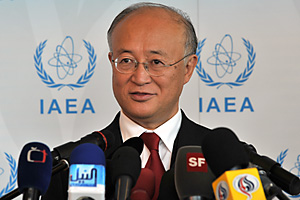The head of the UN’s nuclear watchdog said he was “frustrated” over Iran’s delays in giving immediate and full access to a military site that is not a declared nuclear site, and thus not technically within the agency’s jurisdiction.
 “We consider it essential for Iran to engage with us without further delay,” Yukiya Amano, director general of the International Atomic Energy Agency (IAEA) said Monday in reference to the Parchin military site. He also said he was disappointed that negotiations over Iran’s nuclear program haven’t led to a final agreement.
“We consider it essential for Iran to engage with us without further delay,” Yukiya Amano, director general of the International Atomic Energy Agency (IAEA) said Monday in reference to the Parchin military site. He also said he was disappointed that negotiations over Iran’s nuclear program haven’t led to a final agreement.
But international observers should not be surprised that Iran hasn’t followed every demand and dictate of the inspectors and the Western -led negotiators.
In Moscow, the Iranians offered a proposal that included agreeing to halt uranium enrichment to 20 percent, to more fully cooperate with international inspections, and to “operationalize” the Supreme Leader’s fatwa against nuclear weapons. In exchange, Iran asked for easing economic sanctions and international recognition for Iran’s right to have a peaceful nuclear program under the Nuclear Non-Proliferation Treaty.
The proposal from the P5+1 demanded that Iran halt 20 percent enrichment, ship out its 20 percent stockpile, and dismantle the highly fortified Fordo enrichment facility. In exchange, the US-led group offered Iran spare parts for its civilian air planes, a pathetic offer that they must have known would not result in much reciprocation.
The so-called diplomacy with Iran has been “predicated on intimidation, illegal threats of military action, unilateral ‘crippling’ sanctions, sabotage, and extrajudicial killings of Iran’s brightest minds,” writes Reza Nasri at PBS Frontline’s Tehran Bureau. These postures have spoiled the chance to resolve this issue promptly and respectfully.
After the failed talks in 2009 and 2010, wherein Obama ended up rejecting the very deal he demanded the Iranians accept, as Harvard professor Stephen Walt has written, the Iranian leadership “has good grounds for viewing Obama as inherently untrustworthy.” Former CIA analyst Paul Pillar has concurred, arguing that Iran has “ample reason” to believe, “ultimately the main Western interest is in regime change.”


